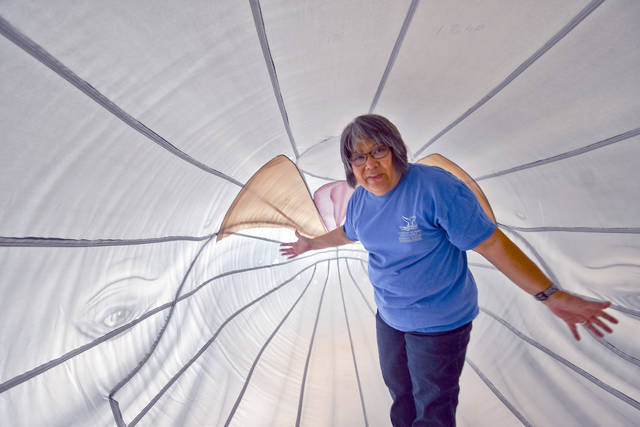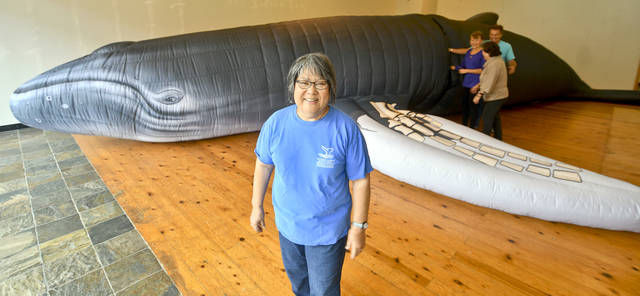Friday kicked off the second OceanFest on Kauai, a four-week lineup of events highlighting Hawaiian culture and marine life. This year’s theme is “The Ocean That Connects Us,” and illustrating that point will be multiple lectures and panel discussions, keiki activities with take-home crafts, pop-up shops and a brand-new, life-sized, inflatable humpback whale.
OceanFest is held on Friday evenings and Saturdays at Kukui Grove Center and runs through Feb. 23, but the whale will only be at Kukui Grove Center through today before it moves to different places on the island.
Staged at two spaces in Kukui Grove Center, the lineup of events changes each weekend, with discussions on topics including new technologies in conservation, restoration projects on Kauai, and the island’s endangered animals and marine life.
Two olelo Hawaii nights will be hosted throughout the event at Kukui Grove Center, with screenings of “Moana” in the Hawaiian language and of Na‘alehu Anthony’s film “Moananuiakea: One Ocean, One People, One Canoe,” a tale of Hokulea and her Malama Honua Worldwide Voyage.
Hosted in KGC’s newly renovated food court and on their new screening system, the movies will highlight the Hawaiian language and the connection of Hawaiian culture to the ocean.
OceanFest 2019 is all already underway at KGC, but just before the festival kicked off, organizers Melissa McFerrin-Warrack of KGC and Jean Souza of the Hawaiian Islands Humpback Whale National Marine Sanctuary sat down with The Garden Island and talked about how the festival started and how the whale made it to Kauai.
The inflatable humpback whale isn’t staying at Kukui Grove for the whole festival, right? Where did it come from and where is it going?
Souza: We (Hawaiian Islands Humpback Whale National Marine Sanctuary) bought it through a grant. It was about $10,000. It was on Oahu and we bought it over here, and then from here soon it is going to Maui. We only have it for a little while. It’s life-like size. It’s actually not a fully grown whale. We inflate it and then they (festival attendees) go inside and we explain some of the biology of the tail and the bones. Then we sit in the mouth and I have some baleen for display, so we talk about how their mouth is like a giant net and how they feed.
After that, we come out and the kids have some take-home activities to do. It reinforces the lessons, so you put the fins on a whale and some other things, and take it home. Then you can show your friends or your siblings.
The whale will only be here on Kauai for a week, but Sunday (today) is the last day it’s at Kukui Grove. Then, on Monday (Feb. 4) it’s at the Lihue Library and then it goes to the Princeville Library on Wednesday (Feb. 6). After that, it goes to Maui.
How did OceanFest get started?
McFerrin-Warrack: Well, Jean and I know each other from when I was property manager of the Kukui Grove Executive Center, where her office is. We’ve worked on many projects together, most of the partners in OceanFest have. When I became property manager here at Kukui Grove, we started on the vision of adding more life to the space, more programs for the whole community and more tenants.
I got the idea from thinking about the Mokupapapa Discovery Center in Hilo. I thought we should have something like that here, an ocean festival. We didn’t have one at the time, so we started it. We planned a four-week festival in five weeks over the Christmas season. We decided to have it in January or February because that’s when the whales are here, and there are people always asking questions about where they can get more information.
Souza: Many of our partners had been doing similar things and smaller events with talks and lectures all around the island already. We have talked for years about how Kauai needs an interpretative or discovery center like the one in Hilo. We’re surrounded by the ocean, but we don’t have anything like that. So, for the next four weekends, we’re going to have a variety of different opportunities for people to come and learn and have fun.
Several partners in this project are federal agencies and workers. Did the government shutdown impact OceanFest at all and is there a chance it could?
Souza: We were very prepared going into the shutdown, but weren’t sure when it was going to be over, and it’s still temporary as of right now. We had to juggle schedules and a few little things around. It’s funny, because we gave ourselves more time and were more prepared than last year, but then the shutdown happened.
McFerrin-Warrack:Throughout all of that, we have to say that the personal dedication of our experts that are coming together to put this on is amazing. They’ve been here late and working last-minute to get everything together.
Souza: We do have it scheduled, just in case we go into another shutdown, that OceanFest won’t be impacted. Only some of our partners are federal, so we have it scheduled.
McFerrin-Warrack:One of those things is the Ocean Count volunteer training and whale lecture.
Souza: I do that every year before our whale counts. This year, because of the shutdown, I couldn’t do the lecture. We had little mini trainings during the Ocean Count (where volunteers count whales from shorelines throughout Hawaii to contribute to humpback whale data), which works, but it’s not the same as having the full understanding of what you’re looking for. So, we’ve scheduled that for Friday, Feb. 15, so we’ll have that done.
What are some of the topics of discussions, lectures and activities that people can look forward to?
Souza:Our goal this year is to present some new information. We’ve had talks on seabirds before, for instance, but we’re bringing in people who can talk about their newest efforts to minimize fallout — like the lasers they’re using on the (power) lines. We’ll have Na‘alehu Anthony here and he’ll present his movie, “Moananuiakea: One Ocean, One People, One Canoe.” We also have Malia Nobrega-Olivera (UH Manoa Hawai‘inuiakea community engagement specialist), who is doing in olelo Hawaii night and screening Disney’s “Moana” in the Hawaiian language.
McFerrin-Warrack: That’ll be the first time Kukui Grove is using its brand new projector and sound system together, so that’s a really special time to debut the system. There’s also a lot of different kids activities and fun things to do.
Is this a good opportunity to understand how to volunteer in conservation on Kauai, and how valuable are volunteers to conservation here?
Souza:Without volunteers I couldn’t do what I do. I’m just one person. When it comes to putting on the festival, a lot of the volunteers are already trained, and we need that because we’re doing lessons and sharing information. But it’s a good opportunity for volunteers in the different areas (those working with the seabirds or monk seals, or NOAA volunteers, for example) to come together and learn from each other.
McFerrin-Warrack:Last year we had someone come through whose daughter was thinking about going into this field (marine conservation), and so she was able to connect and get information from all the different volunteers and staff.
•••
The full schedule for OceanFest is available online at www.kukuigrovecenter.com, under the Events tab. For more information, call 977-8677 or email info@kukuigrovecenter.com.







Inflatable whale, great idea! Just to give a shout-out to Storybook Theatre in Hanapepe, Director Mark Jeffers has been promoting ocean-environmental awareness for many, many years via “inflatables,” including a whale. Children enter, hear a story, learn, ask questions–a wonderful way to “inflate” learning! Whale, trout, chicken and a number of other inflatables have benefited Kauai children for years (and across the state through Storybook’s statewide TV program.) Now if grants of $10,000 can come Storybook’s way for a single inflatable, there will be celebrating in the streets of Hanapepe!